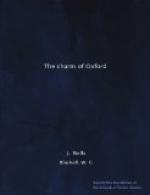“Here’s a fine
piece of work! Your Cardinal
A college plans, completes
a guzzling-hall.”
Certainly the hall of Christ Church is the finest “popina” which has ever been abused by envious critics; its size and magnificence place it easily first among the halls of Oxford, and its great outline stands conspicuous in all views of Oxford from the south, whether by day, or when by night, to quote M. Arnold’s “Thyrsis”:
“The line of festal light in Christ Church Hall”
shines afar. And the kitchen, a perfect cube in shape, is worthy of the hall which it feeds, and is, perhaps, more appreciated by many of Oxford’s visitors; for the taste for meringues is more common than that for masterpieces of portraiture. The report to Wolsey, in 1526, by his agent, the Warden of New College, is still true; the kitchen is “substantially and goodly done, in such manner as no two of the best colleges in Oxford have rooms so goodly and convenient.”
The approach to the hall, seen in Plate XVIII, is later than Wolsey’s work, but is fully worthy of him. The beautiful fan tracery, which hardly suffers by being compared with Henry VII’s Chapel at Westminster, was put up, extraordinary as it may seem, in the middle of the seventeenth century, by the elder Dean Fell; all we know of its origin is that it was the work of “Smith, an artificer of London,” surely the most modest architect who ever designed a masterpiece. The staircase itself is later, the work of the notorious Wyatt, who for once meddled with a great building without spoiling it.
The history of Christ Church is very largely the history of the University of Oxford. It is still our wealthiest and largest foundation, although the disproportion between it and other colleges is by no means so great as it once was; and, thanks to its having been ruled by a series of famous and energetic deans, its periods of inglorious inactivity have been fewer than those of most other colleges. The roll of deans contains such names as those of John Owen, the most famous of Puritan preachers, John Fell, theologian and founder of the greatness of the Oxford Press, Henry Aldrich, universally accomplished as scholar, logician, musician, architect, Francis Atterbury, Jacobite and plotter, Cyril Jackson, who ruled Christ Church with a rod of iron, and who ranks first among the creators of nineteenth-century Oxford, Thomas Gaisford and Henry George Liddell, great Greek scholars. It seems that a college gains something by having its head appointed from outside; the Dean at Christ Church is appointed by the Crown.




